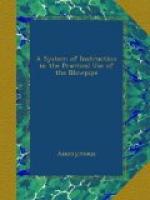* * * * *
Mineral. Nickel glance
Formula. NiS^{2} + NiAs.
Behavior
(1) in glass-bulb. Decrepitates
and gives an orange colored
sublimate
of AsS^{2}.
(2) in open tube. As the preceding.
(3) on charcoal. As the preceding.
(4) in forceps. —
(5) in borax. As copper nickel.
(6) in mic. salt. Gives the
nickel reaction occasionally somewhat
obscured
by cobalt.
(7) with carb. soda. As the preceding.
(8) Special reactions. As copper nickel.
* * * * *
Mineral. Ulmannite
Formula. NiS^{2} + Ni(AsSb)^{2}.
Behavior
(1) in glass-bulb. Gives a slight
white sublimate of SbO^{3} and
more
or less AsS^{3}.
(2) in open tube. Gives off
thick fumes of SbO^{3} and SbO^{5}
with
AsO^{3} and SO^{2}.
(3) on charcoal. As glance
cobalt, but accompanied by dense fumes
of
SbO^{3}.
(4) in forceps. —
(5) in borax. As copper nickel.
(6) in mic. salt. As the preceding.
(7) with carb. soda. As the preceding.
(8) Special reactions. As copper
nickel generally, but arsenic is not
always
present.
* * * * *
Mineral. Cobalt pyrites
Formula. ([,Co][,Ni][,Fe]) ([,,,Co=][,,,Ni=][,,,Fe=]).
Behavior
(1) in glass-bulb. When strongly
heated gives off sulphur and
becomes
brown.
(2) in open tube. Gives off
much SO^{2} and a small quantity of
AsO^{3}.
(3) on charcoal. In the reducing
flame small fragments fuse with
the
evolution of sulphur to a magnetic bead
having
a bronze colored fracture.
(4) in forceps. —
(5) in borax. In the oxidizing
flame on charcoal gives a
violet
colored glass. In the reducing flame the
nickel
is reduced and may collected in a gold
bead.
When the nickel is removed, the glass
exhibits
a slight iron reaction while warm.
(6) in mic. salt. As in borax,
but the reduction of the nickel is
more
difficult than in the latter flux.
(7) with carb. soda. As glance cobalt.
(8) Special reactions. As copper
nickel, but the amount of arsenic is
usually
very small.




